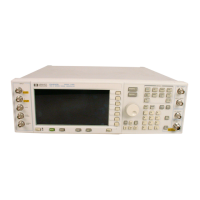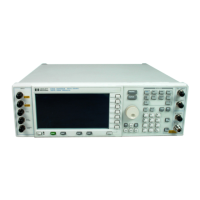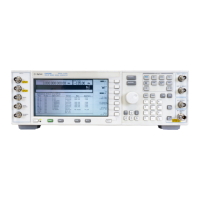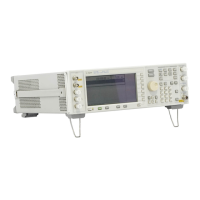1-96
Troubleshooting
Reference/Synthesis Loop Description
Ramp Sweep (Option 007)
The following basic functions are required to generate an accurate sweep in ramp sweep mode:
• coarse and fine tune
• sweep rate control
•sweep generation
• output frequency monitoring or feedback
Example (start 3.2 GHz, stop 10 GHz, sweep rate 50 ms)
The A18 CPU sets the A9 YIG Driver Sweep DAC for a +3.2V output, which results in a YIG
oscillator output of approximately 3.2 GHz. To sweep the instrument from 3.2 to 10 GHz, a
programmable counter on the A9 YIG Driver increments the Sweep DAC’s output to +10V.
The speed at which the output of the Sweep DAC changes determines the instrument's sweep rate.
The rate of change is controlled by the output frequency of a digitally developed synthesis (DDS)
chip on the A9 YIG Driver. The A18 CPU sets the DDS output to a frequency between 0 and 25
MHz, and the DDS output frequency clocks a programmable counter that drives the Sweep DAC
rate of change. A low DDS frequency produces a slow sweep rate; a high DDS frequency produces a
high sweep rate.
In ramp sweep mode, the A9 YIG Driver Pre-tune DAC is set to 0V. Delay compensation is added to
improve linearity, and a fine tune correction from the A6 Frac–N is summed with the Sweep DAC
voltage to maintain phase lock. The phase lock correction voltage is generated on the A6 Frac–N by
coupling off some of the YIG output frequency in the A29 20 GHz Doubler, and routing it to the A6
Frac–N. On the A6 Frac–N, fixed and programmable dividers (controlled by the A18 CPU) divide
the RF signal down to 5 MHz.
Also on the A6 Frac–N, 10 MHz from the A7 Reference is divided down to 5 MHz. The phase of the
two 5 MHz signals is compared and integrated. The integrator’s output is routed to the A9 YIG
Driver and summed with the Sweep DAC (YIG Drive) voltage to maintain phase lock during sweep.
After the A18 CPU has everything set up, the A9 YIG Driver programmable counter is enabled and
sweep begins. The A6 Frac–N divide numbers determine how far the A6 Frac–N sweeps before the
A18 CPU calculates new divide numbers. The A6 Frac–N divide numbers are updated at filter
switch points and at band crossings. During multiple band sweeps, the A9 YIG Driver Sweep DAC,
DDS, and delay compensation are updated at band crossings.
A7 Reference
Clean and stable reference signals are essential to frequency accuracy and low phase noise. In this
case, two reference signals are provided:
• 1 GHz (to the A5 Sampler and the A8 Output, for down conversion)
• 10 MHz (to the A6 Frac–N for VCO phase coherency, and the A9 YIG Driver for DDS clock
accuracy).
The standard A7 Reference uses a 1 GHz STW Oscillator and 10 MHz OCXO.
The low phase noise A7 Reference (Option UNR) uses a 100 MHz VCXO that is multiplied by 10 to
achieve 1 GHz, and a high performance 10 MHz OCXO.
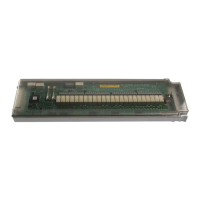
